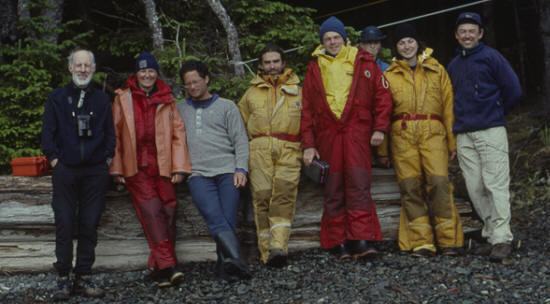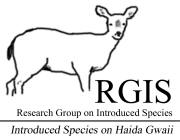-
Menu
-
Home
-
Haida Gwaii
-
Introduced Species
-
RGIS
- What did we learn?
-
Research
- Publications
- RGIS symposium
- School curriculum
- Contacts
-
English
-
Français
|
Presentation
|
|
|
The Research Group on Introduced Species (RGIS) developed
from collaborative work between partners from Canada and
France. It took shape in the nineties to conduct research
and publicize information on the effects of introduced
species on natural ecosystems within the Haida Gwaii archipelago
(aka
Queen Charlotte Islands)
in British Columbia, Canada, and to draw more general
lessons on the ecology of temperate forests.
In 2001, it was registered as a not for profit trust based
in Queen Charlotte City. It is an international consortium
that brings together:
- Several federal and
provincial government agencies from Canada:
It maintains close collaborations with several
universities and research agencies from Canada and
France.
|
|
|

|
|
|
The main thrust of RGIS projects has been to explore the
impacts of introduced black-tailed deer and, to a lesser
extent, red squirrels on forest ecology in the archipelago.
The emphasis has been on natural forest ecosystems, but work
on commercially managed forests has also been included.
A major field program, aimed at elucidating the costs of the
introduced deer to the overall biodiversity of the
archipelago, peaked during 1996–2002, involving 14
scientists and 9 graduate students. This research is ongoing
through the monitoring of long term
changes in the absence or
presence of deer population regulation.
In 2011 we
launched a second major field
program, to study
the role of predation risk on the
interactions between
deer and the forest
(ANR-BAMBI). It involves 5 academic partners from France
(CEFE-CNRS, CEFS-INRA, Université Paul Sabatier) and Canada
(University of Northern BC and Université Laval à Québec)
and in 2012 keeps 3 phD student and several master students
busy. It is also supported by the
Laskeek Bay
Conservation Society and
Gwaii Haanas National Park Reserve, Heritage Site and Marine
Conservation Area.
For more details on RGIS see :
Team - Study sites -
Field camp |
|
Funding
for the RGIS project came from:
|
|
|
|
|
return to top of page |
|


